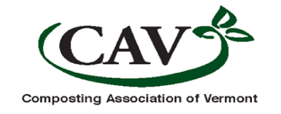On-Farm Community-Scale Food Scrap and Agricultural Organic Waste Management in Vermont and New Hampshire
Funded by a USDA Rural Utility Services Solid Waste Management Grant Program
The purpose of this project is to reduce solid waste, avoid water pollution, and increase soil health by providing technical support and training for community-scale food scrap composting and manure management on farms in rural and small communities in Vermont and New Hampshire. While developed and extended to farmers in these two states, the toolkit and remote training resources will serve as a model and be applicable to rural small-scale farming communities throughout the U.S.
This project offers participating farms and communities a cost-effective solution for diverting food and organic waste to composting and improving manure management, resulting in significant benefits including: 1) solid waste diversion; 2) the use of compost for farming, helping to spark more interest in healthy soils, reduced use of fertilizers, and potentially reducing food insecurity; 3) exploring the use of compost for meeting required agricultural practices (RAPs) and erosion control applications, resulting in decreased water pollution; 4) helping to create a more “waste-aware” mindset through local management, diversion, and composting of food scraps and other organic materials (field refuse and manure) to raise awareness about waste management and water pollution in rural and small town communities; 5) increasing adoption of creative food recovery to benefit communities and build resiliency; 6) diversifying farm income streams for increased farm viability.
The project focuses primarily on small farms. While some farmers compost for on-farm use, few accept off-farm food scraps for composting. Operators of small farms frequently lack the knowledge, time, and resources to effectively manage and compost livestock manure. Agricultural Extension agencies and other farm support organizations offer few resources for on-farm composting of food scraps. Farmers often find it difficult to maneuver through food scrap management regulations and certification requirements. Moreover, selling compost products off-farm presents challenges that relatively few have successfully navigated. Small farm operators can benefit greatly from gaining training and assistance to diversify their farms through on-farm composting to become more sustainable and economically viable. Small farms often adopt community supported agriculture models and can build upon these models to benefit their farm and community through community-based food scrap collection and composting.
Project components:
Farm composting assessment and resource base to clarify the needs of small farmers and their communities for effective collection and composting of food scraps and integration of food scraps with composting manure and other farm organic residues.
A multimedia ‘toolkit’ for both farmers and community members about how to establish and sustain community-based composting sites on farms, including a farm compost business plan, and promote local food recovery. The toolkit will include written tip sheets, videos, and webinar recordings.
Virtual and onsite, hands-on technical assistance and support for the management of food scrap and agricultural organic waste through community-oriented composting sites on farms.
Remote, local and regional trainings covering all aspects of community food scrap and agricultural organic waste composting. Remote training will include the project multimedia ‘toolkit’ resources, and phone/email technical assistance provided to farmers and community members. Onsite technical trainings at each on-farm community-oriented composting site will including focused trainings for the farm composters and will be open and extended to other farmers in the area and their wider communities.
Project Steering Committee Members:
Juan Alvez, UVM Extension
Joe Buford, NRCS
Chadd Cupit, NRCS
Gary Deziel, UVM Extension
Kelly Dolan, VSJF/Farm to Plate Network
Maureen F. Prohl, Citizens Advisory Committee, Town of New London, NH
Stephanie Smith, Vermont Agency of Agriculture, Food & Markets
Zach Szczukowski, Vermont Agency of Agriculture, Food & Markets
Olivia Uyizeye, Upper Valley Lake Sunapee Regional Planning Commission, Lebanon, NH
Paige Wilson, Waste Reduction & Diversion Planner at NHDES
Devon Brodie, NRCS Soil Scientist (former PSA member)
Ollie Cultrara, Farmer (former PSA member)
Sarah Danly, Vital Communities (former PSA member)


